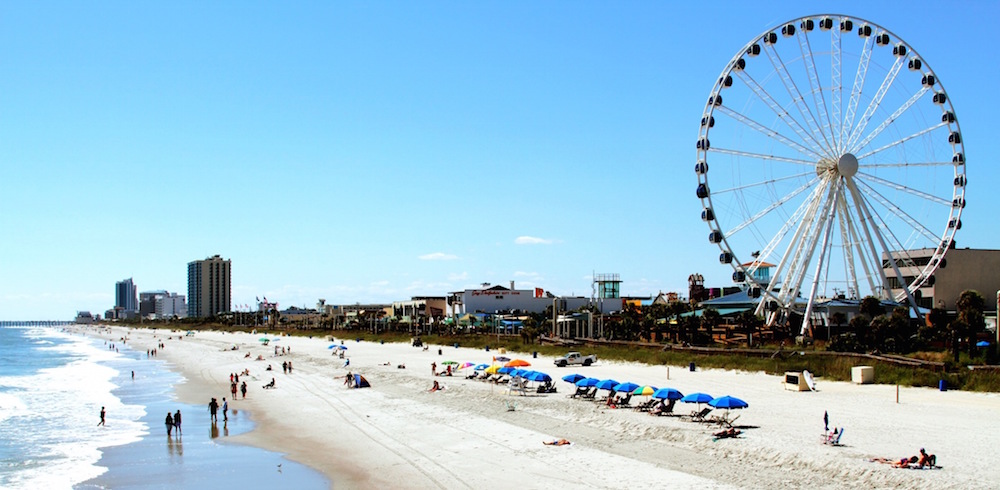
Thousands of people — both tourists and new residents — flock each year to the Myrtle Beach-Conway-North Myrtle Beach, SC, metro area for the beaches, the abundant sunshine, the golf courses and more.
It’s safe to say that most Americans think first and foremost of the Myrtle Beach area as a getaway destination. What the millions of visitors may not realize when they’re frolicking in the sand is that the region is home to a major university.
Growth on the Coast
Coastal Carolina University, located in Conway, has more than 10,000 students and nearly 1,400 employees. The public university, about 15 miles northwest of Myrtle Beach, pumps almost $584 million a year into the regional economy.
About 10,000 students attend Coastal Carolina University in Conway, SC.
Photo: Coastal Carolina University
Given the impact of Coastal Carolina on the community, Conway — and, by association, the rest of the metro area — qualifies as a college town. And this college town is growing a lot. Myrtle Beach-Conway-North Myrtle beach was the fastest-growing “college town” metro area in the U.S. from 2010 to 2016, a LawnStarter study of U.S. Census Bureau data shows.
Here is the ranking, with the home of Coastal Carolina at the head of the class:
- Myrtle Beach-Conway-North Myrtle Beach, SC — 2010-16 growth rate, 18.68 percent
- Greeley, CO — 2010-16 growth rate, 16.65 percent
- Fargo, ND — 2010-16 growth rate, 14.06 percent
- Fort Collins, CO — 2010-16 growth rate, 13.47 percent
- Auburn-Opelika, AL — 2010-16 growth rate, 12.92 percent
- Bryan-College Station, TX — 2010-16 growth rate, 11.48 percent
- Wilmington, NC — 2010-16 growth rate, 10.86 percent
- Iowa City, IA — 2010-16 growth rate, 10.64 percent
(To see complete details about our ranking, check out the graphic at the bottom of this post.)
In 2010-16, the population of the Myrtle Beach area climbed 18.7 percent. From 2015 to 2016 alone, the area’s population jumped 3.9 percent, making it the country’s second fastest-growing metro area during that time.
Major Schools in Fastest-Growing College Towns
| School | Total school enrollment (fall 2016) | Students as % of region’s 2016 population |
|---|---|---|
| Coastal Carolina University | 10,479 | 2.33% |
| University of Northern Colorado | 13,087 | 4.44% |
| North Dakota State University | 14,432 | 6.06% |
| Colorado State University | 33,198 | 9.76% |
| Auburn University | 28,290 | 17.79% |
| Texas A&M University | 66,426 | 26.06% |
| University of North Carolina at Wilmington | 15,740 | 5.57% |
| University of Iowa | 33,334 | 19.74% |
‘Our Secret Is Finally Out’
Devin Parks, director of economic development and government relations at the Conway Chamber of Commerce, says Myrtle Beach-Conway-North Myrtle Beach appeals to people from all age groups and demographic groups.
“The area is gaining population because our secret is finally out,” Parks says. “With a low cost of living combined with our excellent academic institutions and booming tourist industry, our area is known as an ideal location to raise a family, or settle down and enjoy retirement.”
Nearly 26,000 people live in Conway, SC.
Photo: Conway Chamber of Commerce
That’s certainly the case in Conway, the true “college town” in the metro area. Parks says a recent headcount indicates 25,758 people live there, or about 300 more people than had been projected for 2021.
“There is no indication that this trend will decrease in the near future — in fact, quite the opposite,” says Parks, an alumnus of Coastal Carolina.
8 Fastest-Growing ‘College Town’ Metros
Our ranking was limited to “college town” metro areas with less than 500,000 residents in 2016 and population growth of at least 10 percent from 2010 to 2016. To qualify for our list, a metro area had to have a university with at least 10,000 students, and that university had to be one of the region’s major employers.
To learn more about the population of an area:
- In the chart, click on the bar next to the name of that region’s major university.
- On the map, click on the logo of a university.





![Enhulk Pro Series 930 CFM Cordless Leaf Blower [Review]](https://www.lawnstarter.com/blog/wp-content/uploads/2023/11/Enhulk-930-Leaf-Blower-Hero-Image-150x150.jpg)

